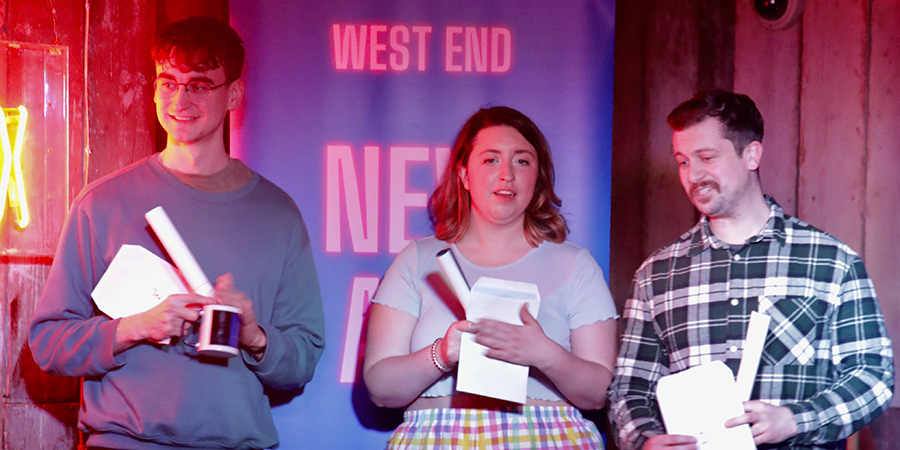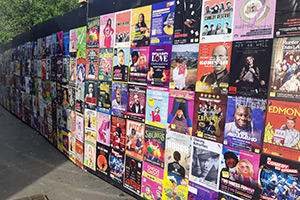Edinburgh Fringe and new comedians: What's in it for you?

Stand-up Steve Mclean has been heading up to the Edinburgh Fringe since 2011. As he prepares to host The West End New Act of the Year Showcase at this year's festival, he answers FAQs new comedians have about the Fringe, and offers some advice to those thinking of attending for the first time...
Between November 2021 and March 2022, I was the resident MC of the West End New Act of the Year comedy competition. Part of the prize for the finalists is a showcase show at the Edinburgh Fringe. The competition was open to all acts who had been performing under three years with the idea of helping those comedians who were most hampered in progress by the pandemic.
Since many acts attending the showcase show will be coming to the Edinburgh Festival for the first time, I've been answering many thoughts and questions. Here's some of my answers to a few of the frequently asked questions...
Why go?
I get asked this all of the time and I totally understand why a new act would ponder it. They see the cost and they see the frazzled, knackered faces that came back with no visible reward. So why go?
If you're a new act, you don't go to Edinburgh to get discovered... you go to get better. A week of Edinburgh stage time is worth three months in your hometown. You'll face off against every kind of audience and every kind of room. If you hustle, then you can pick up more stage time in a day than you'll otherwise get in a week.
Tip: Have a tight five-minute video uploaded, ready to send to promoters you run in to while there. Maybe have a print-out of a QR code link to the video to give to them in person.
How can I go, I'm not ready yet?
No one is ready for Edinburgh. If you wait until you're ready (whatever 'ready' is) then you'll never do it. If you've got 10 minutes, go up and look for 10 minutes spots on compilation shows. If you have 15 then book a split show with other acts who have 15. Only got 40? Apply to do a 40-minute show.
Comedian Jon Long once referred to the Edinburgh Fringe as a gym for stand-ups and he was right.

Doesn't it cost a lot?
It does. I'm sorry. But if comedy is yet to be your living then it also doesn't. Total up what a five-minute spot costs you? Let's say you do three a week. Travel, a drink or two at the gig, something to eat after? Offset that against your trip to Edinburgh.
Like I say, if you hustle you can pick up 5 or 6 spots a day. Plus you'll make a load of contacts and get an 'extended run' of stage time perfecting your craft without the gaps and breaks that make you rusty.
Tip: Offset the cost of the Fringe by picking up flyering, tech or front of house work.
My friends are all going on holiday, won't I get FOMO?
What you're doing is very special - if you're just doing spots you've gone from being a new comedian to a new stand-up comedian who has performed at the Fringe.
If you're doing a show of any kind, you've crossed the barrier of consumer to producer. You're now in the same group as say Stewart Lee or Sarah Silverman or whoever your comedy hero is. You might be in a 30-seater under a bookies and they're in a 300-seater but you're saying to the public ''come here and listen to me'' and that is amazing.
When all your friends and family get together in a pub at Christmas or New Year or whenever and they say 'I went to the Canary Islands on holiday this year' or 'I went backpacking' or something that almost anyone can do if they save up for long enough, you can say 'I produced and performed a show at the Edinburgh Fringe'. I'd put good money on you being the only one in that pub, postcode and possibly town that can say that.
Remember: Your friends will be jealous of you for doing this, not the other way around.
Is it hard?
Let's not mess around here, it's not easy. But nothing worthwhile is, right? If you're having a bad Fringe don't be jealous of the people who are having a good Fringe because they are proof that you too can have a good Fringe. If it's going well don't sneer at those struggling because almost every five-star act is a two star at some point in the past or in the future.
Tip: Take a proper day off during the whole run. Get out of the city, to the beach or into the hills. Someone smarter than me once said "Everything can seem pretty skewed if you live on beer and chips".

I heard you shouldn't do it until someone pays for it for you
That's an adage and not sure one that is true anymore. For a start, it's skewed. No one is going to pay for it for you (lest you have a wealthy benefactor, like Penelope Pitstop). Someone may offer to put the money up front, but they'll always want that money back, often with interest. It'll come out of your ticket sales and if you don't sell enough tickets to cover the cost then you will owe them money, with interest.
Tip: If a company offers to 'produce' your show then make sure you know what you're getting upfront. The Fringe is littered with stories about acts who have agreed a breakeven point on ticket sales only to find after that there are lots of hidden extras like 'lightbulb cleaning' or 'overnight storage charges'.
You only get one chance at winning Best Newcomer, what if I blow it?
There will be 1000 newcomers every year. Your chances of not 'blowing it' are 1/1000. Most star acts don't win Best Newcomer, otherwise we'd only have around 25 or so gigging stand-ups.
If it's something you're really worried about then remember, the rules of Newcomer are very much there to favour the industry. There's an often-told tale of the comedian who performed shows at the Fringe for 7 years before winning Best Newcomer as they had been doing shows that were under 45 minutes in length. Shows that are under 45 minutes aren't eligible for the Fringe Newcomer Awards. Make of that what you will.
Tip: 40-minute shows are a great way to build your stage craft and teach you how to hold an audience. Do a run of them before you tackle your debut hour.
What happens if no audience turn up to my show?
Then you pull the show, find some mates and go for a drink and say 'oh well.' Every performer that you love has pulled shows due to no one coming. It's a rite of passage. Get up earlier the next day, flyer harder than the day before and start again.
Tip: If you're a stand-up, don't listen to the people who will say 'treat an empty room as rehearsal time.' That may be fine for a theatre cast who have each other to both lean on and blame. Trust me, you don't want to be hanging around an empty room that's costing you £££. Get out of there.
Bonus advice: Don't be a dick. Standard Fringe tip for everyone.
This article is provided for free as part of BCG Pro.
Subscribe now for exclusive features, insight, learning materials, opportunities and other tools for the British comedy industry.



